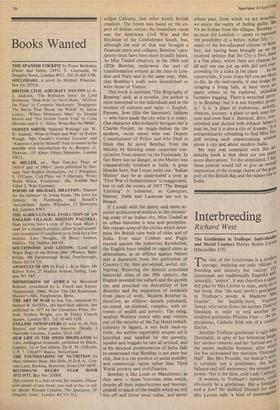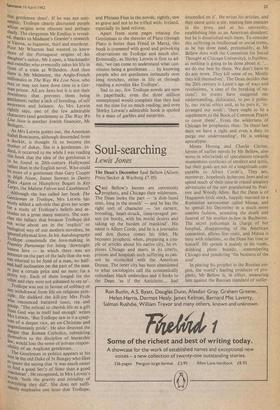Interbreeding
Richard West The Gentleman in Trollope: Individuality and Moral Conduct Shirley Robin LetWin (Macmillan £15) The idea of the Gentleman is a modern outrage, implying not only 'elitism' 11/ breeding and ancestry but 'racism' (fA°I. Gentlemen are traditionally English) ail' naturally, 'sexism'. It was therefore a sPien.,, did joke by Mrs Letwin to state, early on her book, that 'the most perfect gentleman in Trollope's novels is Madame Mn14 Goesler', the humbly-born, Viennese Jewess who turns down the ancient Duke of Omnium in order to wed another 1111: doubted gentleman Phineas Finn — the 0, pecunious, Catholic Irish son of a country doctor. Another Trollope gentleman is ugly MissDunstable, in spite of her bellowing lauV„,,i her tactless remarks and her fortune out '", the patent medicine business, after wIlleii she has nicknamed her mansion 'Ointment Hall'. But Mrs Proudie, the bishop's volifsl is certainly not a gentleman; she lac' balance and self-awareness; she misuses her power. Nor is the false, cold Lady Carbur,Y,i A woman, in Trollope's opinion, co
lou
obviously he a gentleman. But a foreigiler and a Jew? He disliked Disraeli for what Mrs Letwin calls 'a kind of extravagance that. gentlemen shun'. If he was not anti- seoptic, Trollope clearly distrusted people whose origins were obscure and perhaps shady. The clergyman Mr Emilius is reveal- ed, thanks to Madame's Goesler's research In Vienna, as bigamist, thief and murderer. Poor Mr Wharton had wanted to know • more of the Portuguese origins of his daughter's suitor, Mr Lopez, a blackmailer. and swindlerwho eventually takes his life in front of a train at Willesden. And then there is Mr Melmotte, the Anglo-French millionaire in The Way We Live Now, who may or may not have done time in a Ger- man prison. All are Jews but it is not their Jewishness that prevents them being gentlemen; rather a lack of breeding, of self awareness and balance. As Mr's Letwin rightly says, one of the few admirable characters (and gentlemen) in The Way We Live Now is another Jewish financier, Mr Brehgert.
As Mrs Letwin points out, the American Isabel Boncassen, although descended from a docker, is thought fit to become the mother of dukes. She is a gentleman. In- deed, it occurred to me while I was reading this book that the idea of the gentleman is to be found in 20th-century Hollywood rather than in the English novel. Who could be more of a gentleman than Gary Cooper In High Noon, James Stewart in Destry Rides Again or Humphrey Bogart in Key Largo, the Maltese Falcon and Casablanca?
Although she has called her book The Gentleman in Trollope, Mrs Letwin has Wisely added a sub-title that gives her scope for a study of Trollope's beliefs and at- titudes on a great many matters. She scot- ches the fallacy that because Trollope did - not t write about sex in the 'explicit' or 13. tological way of our modern novelists, he Ignored physical love. In his Autobiography Trollope commends the love-making in Framley Parsonage for being 'downright honest love — in which there was no Pretence on the part of the lady that she was too ethereal to be fond of a man, no half- and-half inclination,on the part of the man to Pay a certain price and no more for a Pretty toy. Each of them longed for the other and they were not ashamed to say so'.
Trollope was not in favour of celibacy or
Y withdrawal from life on religious prin- ciple. He disliked the kill-joy Mrs Pride who renounced buttered toast, tea and gossip. 'The refusal to cherish life as a gift
Mrs Letwin. God was in itself bad enough' writes
'sirs Letwin. 'But Trollope saw in it a symp- tom of a deeper vice, an un-Christian and rgentlemanly pride'. He also detected the 'anger that Roman Catholics, submitting Themselves to the discipline of hierarchic law, would lose the sense of private respon- sibility of an Anglican gentleman. The 1 he Gentleman in politics appears at his best in the old Duke of St Bungay who likes to quote the saying that 'it was much easier to find a good Sec'y of State than a good coachman'. He recognised, in Mrs Letwin's Words 'both the gravity and triviality of everything they did'. She does not suffi- ciently emphasise one issue that Trollope,
and Phineas Finn in the novels, rightly, saw as grave and not to be trifled with: Ireland, especially its land reform.
Apart from some pages relating the Gentleman to the theories of Plato (though Plato is better than Freud or Marx), this book is crammed with good and provoking observations on Trollope and much else. Eventually, as Shirley Letwin is first to ad- mit, 'we can come to understand what con- stitutes being a gentleman ... by knowing people who are gentlemen intimately over long stretches, either in life or through reading a novelist like Trollope'.
Sad to say, few Trollope novels are now in paperback; even the three million unemployed would complain that they had not the time for so much reading; and even Shirley Letwin's admirable book is spoiled by a mass of garbles and misprints.



































 Previous page
Previous page